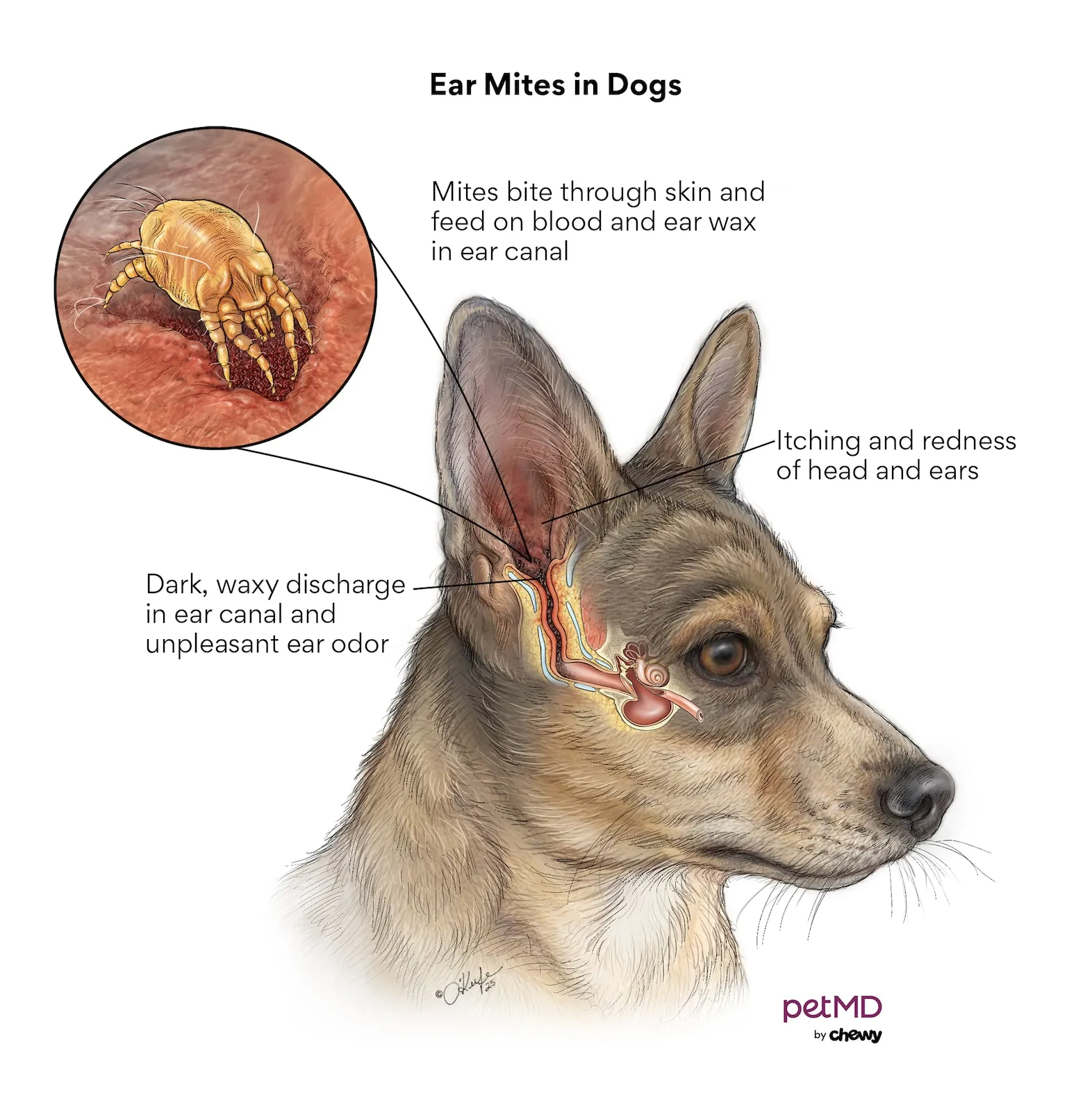Discovering your dog has ear mites often raises a pressing question: Can Ear Mites In Dogs Affect Humans? While concerning, understanding the realities of ear mite transmission is key. Ear mites, Otodectes cynotis, are tiny, highly contagious parasites primarily infesting dog and cat ear canals, causing intense itching. They thrive in warm, dark environments. Let’s explore these parasites, their impact on dogs, and crucially, clarify their potential to affect you.
What Exactly Are Dog Ear Mites?
Ear mites (Otodectes cynotis) are external parasites found predominantly in dog ear canals. More common in cats, dogs—especially puppies and those with outdoor exposure—can also get infested. These microscopic creatures feed on skin debris, causing intense itching and irritation. Untreated, they lead to secondary bacterial/yeast infections, and in severe cases, ear canal damage or hearing issues. Prompt veterinary attention is vital for your dog’s comfort and to prevent complications.
 Diagram showing ear mites in a dog's ear canal, indicating common infestation areas.
Diagram showing ear mites in a dog's ear canal, indicating common infestation areas.
Recognizing the Signs: Symptoms of Ear Mites in Dogs
Early identification of ear mites is crucial. Watch for these common indicators:
- Excessive Head Shaking & Persistent Ear Scratching: Vigorous actions to relieve intense itch.
- Red, Inflamed, and Sensitive Ears: Visible irritation and pain upon touch.
- Unpleasant Ear Odor: Often from secondary bacterial or yeast infections.
- Thick, Dark Ear Discharge: A ‘coffee ground’ appearance—mites, waste, and ear wax.
- Head Tilt: In severe cases, indicating deeper ear problems.
- Hair Loss Around Ears: Due to constant scratching.
- Decreased Appetite or Lethargy: General unwellness from severe discomfort.
If these symptoms appear, particularly the ‘coffee ground’ discharge, consult your veterinarian promptly.
How Dogs Get Ear Mites: Causes and Contagion
Ear mites are highly contagious, spreading mainly through direct, close contact with an infected animal. All household pets are likely to be infected if one has mites. Puppies often contract them from mothers. Dogs can also pick up mites from contaminated environments like bedding. Dogs not on regular monthly [flea worm and mite treatment for dogs](https://dogcarestory.com/flea-worm-and-mite-treatment-for-dogs/) are at increased risk, as these preventatives often offer protection.
Can Ear Mites Pass from Dogs to Humans?
Addressing the crucial question, can ear mites in dogs affect humans? It’s highly unlikely for Otodectes cynotis from dogs to establish a sustained infestation in humans. While extremely contagious among animals, humans are not their natural host due to species specificity.
In very rare instances, an ear mite might transfer to a human, causing brief, localized skin irritation or an itchy rash. This is a superficial reaction, not a true infestation where mites burrow or reproduce; they cannot complete their life cycle on human skin. Any human symptoms are typically mild, temporary, and self-limiting, resolving with basic hygiene.
This differs from other parasites where zoonotic transmission is a higher concern, such as [roundworms that can pass from dog to human](https://dogcarestory.com/can-roundworms-pass-from-dog-to-human/) or other worries like [if my dog has roundworm will i get it](https://dogcarestory.com/if-my-dog-has-roundworm-will-i-get-it/). For ear mites, significant human transmission is not a common veterinary concern. However, good hygiene after handling an infected pet and cleaning shared areas is always recommended. Consult a doctor if you experience unusual skin irritation, though serious human infections from canine ear mites are exceedingly rare.
Diagnosing Ear Mites: A Vet’s Approach
If ear mites are suspected, veterinary diagnosis is crucial. This involves a physical [examination of your dog](https://dogcarestory.com/symptoms-of-heartworms-in-dogs-and-cats/), focusing on the ears with an otoscope for inflammation or discharge. Your vet will inquire about symptoms, duration, preventatives, and other household pets. The definitive test is an ear cytology: debris from the ear canal is examined under a microscope to identify mites or eggs. A stained sample also checks for secondary bacterial or yeast infections.
Effective Treatment for Your Dog’s Ear Mites
Successful ear mite treatment combines thorough cleaning and medication. First, ears are cleaned with a gentle cleanser (e.g., Epi-Otic® Advanced), or an antimicrobial one (e.g., TrizULTRA™+ Keto Flush) if a secondary infection exists. This allows medication to work better.
Primary treatment often uses topical or oral monthly flea, tick, and heartworm preventatives like Bravecto® or Advantage Multi™. Though sometimes ‘off-label,’ they are highly effective, often with a single dose, and safe under veterinary guidance.
For secondary bacterial/yeast infections, topical ointments (e.g., Animax®) may be prescribed. For severe pain/itching, topical or oral steroids (e.g., prednisone) can provide relief. All household pets must be treated simultaneously due to high contagiousness.
Post-Treatment & Prevention: Ensuring Long-Term Ear Health
Dogs usually improve within days, but complete mite elimination takes up to 30 days. Finish all prescribed medication. A follow-up vet visit with repeat ear cytology confirms mites and infections are gone.
Prevention is effective: maintain year-round monthly [flea worm and mite treatment for dogs](https://dogcarestory.com/flea-worm-and-mite-treatment-for-dogs/), as many protect against ear mites. Weekly ear cleaning with a vet-approved cleanser removes debris and reduces infection risk, making ears less hospitable.
Conclusion: Protecting Your Pet and Your Family
Finding ear mites in your dog can be alarming, especially regarding human involvement. However, understanding this common canine parasite is reassuring. Ear mites primarily affect dogs, causing discomfort but posing minimal risk to humans. Early symptom recognition and prompt veterinary care for diagnosis and treatment are crucial. Consistent parasite preventatives and routine ear hygiene are your best tools for protecting your dog. Stay informed and proactive for healthy, mite-free ears and a worry-free home for your family.
WRITTEN BY
Brittany Kleszynski, DVMVeterinarian
Dr. Brittany Kleszynski is a veterinarian and freelance medical writer who specializes in creating meaningful content that engages readers…
